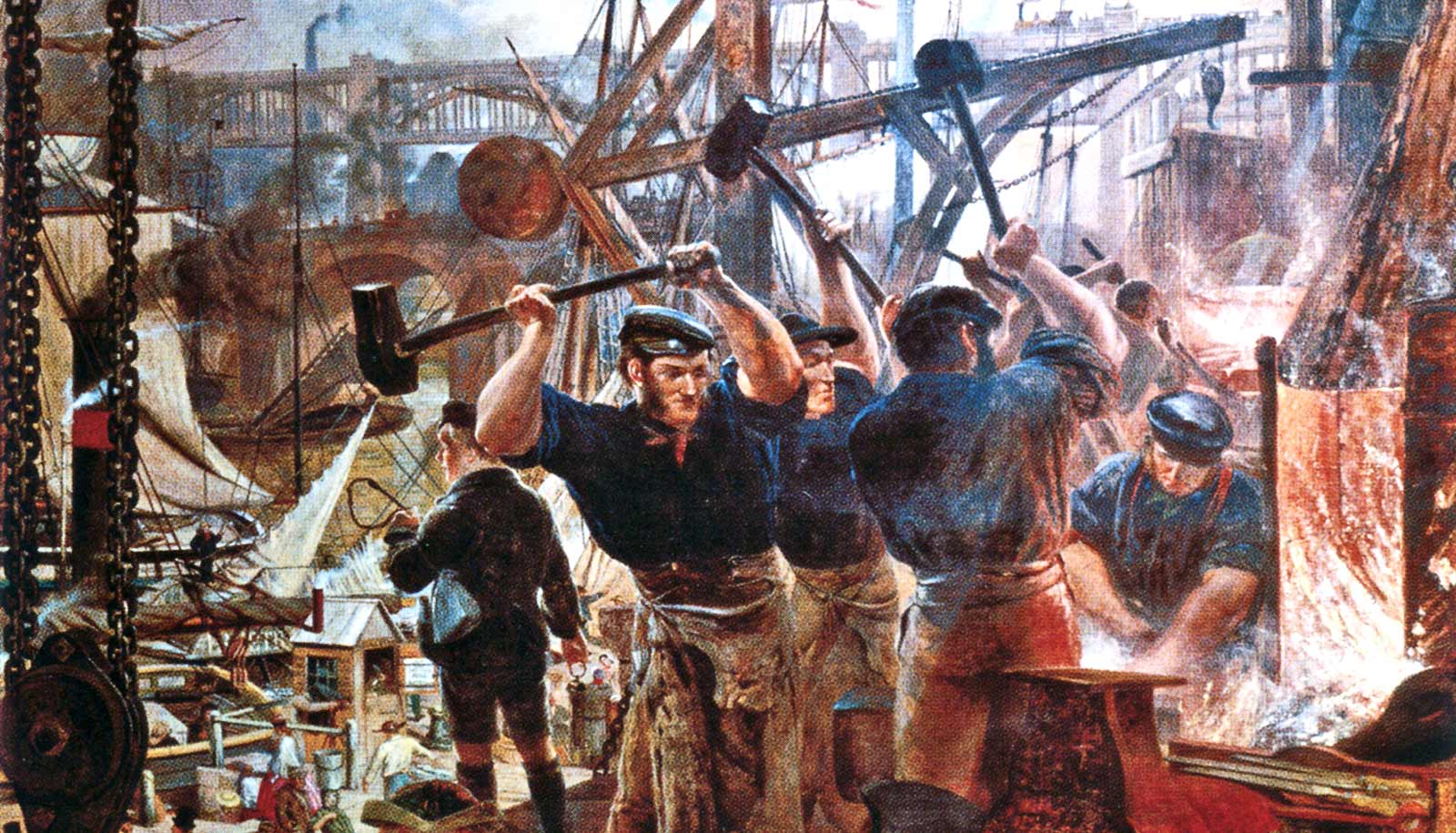War and Great Britain’s gun industry played a more important role in driving the 18th-century Industrial Revolution than scholars have previously recognized, according to new research.
“Let’s acknowledge the fact that Britain was involved in a lot of wars, and in order to pursue those wars the government needed arms.”
Scholars have long debated what led to the evolution of industrialism in the 18th century, a period of economic transformation that most scholars believe was fueled by technological advances in textile manufacturing, steam power, and iron-making.
In her new book, Empire of Guns: The Violent Making of the Industrial Revolution (Penguin Random House, 2018), however, Priya Satia, a professor of modern British history in the Stanford University School of Humanities and Sciences, argues that industrialism really began with Britain’s need for guns and other war supplies.
Satia found evidence that some 18th-century British officials were aware that the domestic production of arms was driving industrialism in Britain. Those officials actively discouraged the development of gun industries in other countries, including those under British rule, such as India. The British government preferred to supply firearms to everyone who needed them, including their enemies.
“We need to stop thinking that Britain invented industrialism because it had an especially laissez-faire government or because it had a unique entrepreneurial genius or culture,” Satia says.
“Let’s acknowledge the fact that Britain was involved in a lot of wars, and in order to pursue those wars the government needed arms. And the British government clearly encouraged innovation within their gun industry.”
The Stanford News Service interviewed Satia about her research.
What inspired you to start this research?
I was originally doing background research on early arms trading for a project on the 20th century when I stumbled upon an article about the Galtons, a family in Birmingham, England, who were in charge of the biggest British gun-manufacturing firm in the 18th century.
What was interesting about the Galtons is that they were practicing Quakers, who are known for their pacifist principles. But throughout the 18th century no one pointed out that their business contradicted their faith. Then suddenly, in 1795, the Quaker meeting in Birmingham ordered the Galtons to either stop making guns or leave the congregation. Instead of complying with this order, the head of the family, Samuel Galton II, published a defense of his position as a Quaker gun-manufacturer.
One of the points Galton made was that every industrial job in Birmingham, which was the center of metallurgical industries in Britain, in some way contributed to war. He argued that he was no worse than the copper supplier, the taxpayer, or the thousands of skilled metal workers producing everything from buttons to pistol springs for the British army.
That was really eye-opening to me. I wondered: What if Samuel Galton was right? What if the Industrial Revolution in the 18th century actually had a lot to do with war?
How else does your research illuminate the current polarizing gun control debate in the United States?
Ever since the Quaker church pointed at Galton and told him he was the problem, people who have worried about the spread of arms in the world have pointed their fingers at arms makers as the main cause of the problem. But we need to acknowledge that industrialism and our modern way of living have generally depended on firearms manufacturing from the beginning.
It’s really hard to keep your hands clean in this industrial, capitalist way of life that was invented in 18th-century Britain. We live in a system of nation-states that depends on mutual terrorization. Every nation-state is supposed to have armed forces with firearms supplied by a firearms industry that needs a market in peacetime, too.
As a result, there is this whole dynamic that’s now depending on American civilians buying a lot of guns, and therefore leading to the US having this high rate of mass shootings.
A lot of people in favor of gun control hold up Australia as an example for the US to follow because they had a massacre in 1996 and immediately passed really tight gun laws, which made people turn in their guns to the government. Since then, the mass shootings have stopped in Australia, and other kinds of gun violence have dramatically declined.
But Australia could do all that because they didn’t have a gun industry to push against tough gun laws. Passage of tight gun controls there and elsewhere around the world made the world’s firearms companies turn even more towards the American civilian market, making gun control ever more difficult in the US.
The United States is the largest exporter of weapons and guns in the world, while its citizens own the most number of guns in the world. And every time there is a threat of gun control, the American civilian market thrives more. The constant fear of gun control is now what drives the industry’s sales.
The gun control debate in America today has revolved around the Second Amendment and what it does and doesn’t mean. But in reality, the heart of this debate should be about figuring out how a war-related industry can survive in peacetime. That’s the structural problem driving the spread of arms.
What were guns like during the 18th century? What were they used for, and by whom?
An 18th-century musket worked really differently from a gun today. They couldn’t even be aimed properly, so they were primarily used as an instrument of terror.
Outside of war, guns were primarily used in disputes over property. They were not used in crimes of passion or in riots because it took so long to load and fire them, and because it was highly unlikely to hit your targets—and because poor people didn’t have them for most of the century.
Gun ownership in general was low in Britain at that time because of the government’s tight gun control. The restrictions were in place because, following the 1689 revolution that established a constitutional monarchy in Britain, the government feared an overthrow.
British army officers constantly complained that their recruits didn’t know what they were doing with the muskets. This and other evidence supports the fact that ordinary Britons did not have guns.
Your research shows how current US legislation is connected to 18th-century British common law. How so?
The Supreme Court’s landmark 2008 Second Amendment decision, District of Columbia v. Heller, determined that sufficiently “long-standing” firearms regulations, meaning those rooted in English common law, are constitutional.
So once you say that 17th- and 18th-century British common law matters for the constitutional laws in the US today, we better get that history right. And there has been a very erroneous understanding of that time, perpetuated by some legal scholars who claim that everyone in Britain had guns in the 18th century.
That’s just wrong. The actual story is that not many people owned guns in Britain then, and the British government enforced strict gun regulations.
Source: Stanford University



